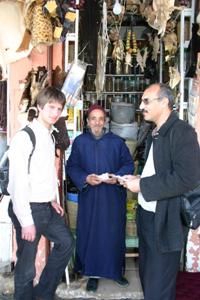Gary J. Martin
A Rufford Small Grant for Nature Conservation is supporting our continued research and a public information campaign for collectors, vendors and consumers of wildlife.

Marrakech market survey: A vendor in the spice market with (l) Hugo de Boer of Uppsala University and Mohamed El Haouzi, GDF-Maroc project coordinator.
The souks of southern Morocco are a major staging post for national and international trade in wildlife, including some endangered species recorded in CITES appendices and IUCN Red Lists.

Aphrodisiac-mixture: A botanical mixture that is ground and mixed with dates and other ingredients for use as an aphrodisiac.
Moroccan authorities face difficult choices on controlling this trade. Under international conventions and national law, they must work to eliminate commerce in endangered species. Apart from ensuring the sustainability of Moroccan biodiversity, this is important because many of the CITES listed species are exported from Morocco to European countries, where wildlife trade laws are even stricter than CITES provisions. Yet any attempts to control the trade in endangered species must be balanced by efforts to enhance local livelihoods and cultural practices by promoting the commercialisation of sustainably managed species used in medicine, ritual and sustenance.
All stakeholders agree that the paucity of information on wildlife trade in Morocco is inhibiting local efforts to ensure its viability, to regulate species that are endangered and to share benefits from those animals and plants which are sustainably harvested.
In order to address this critical issue, the Global Diversity Foundation Morocco team is conducting a public information and research initiative on the risks and opportunities of wildlife trade in southern Morocco. Our partners in this project are the Natural History Museum of Marrakech and the Moroccan Department of Water and Forests. Over the course of three years, we have put together a reference collection and database of over 80 animal species of 300 plants species that are commercialized in the marketplaces of Marrakech and surrounding areas.
In coming years, we will produce an innovative 'Guide to Sustainable Shopping' manual, CD-ROM and website that will have 'green pages' for species that are at low risk from overharvesting, 'yellow pages' for species at moderate risk, and 'red pages' for species that are protected by national law, or listed in CITES appendices. The manual, initially published in French, will be distributed to local residents, merchants, industry representatives and government officials. It will assist stakeholders to decrease the sale - particularly to tourists and for export - of endangered wildlife, while promoting the purchase of species that are obtained in a sustainable way and that can bring benefits to producer communities.